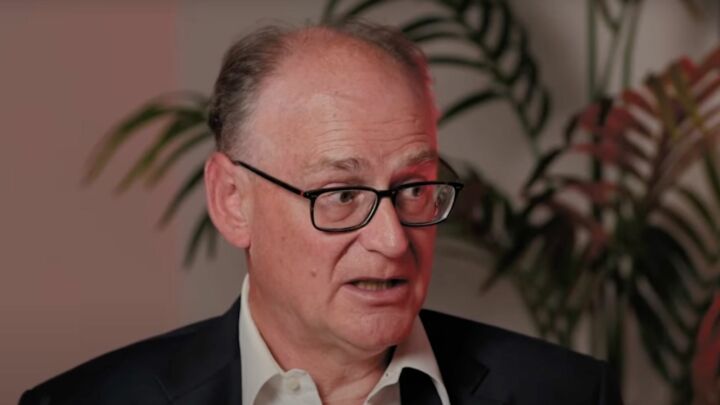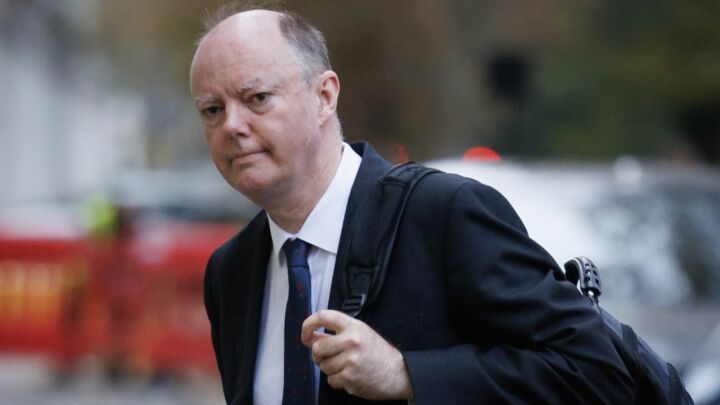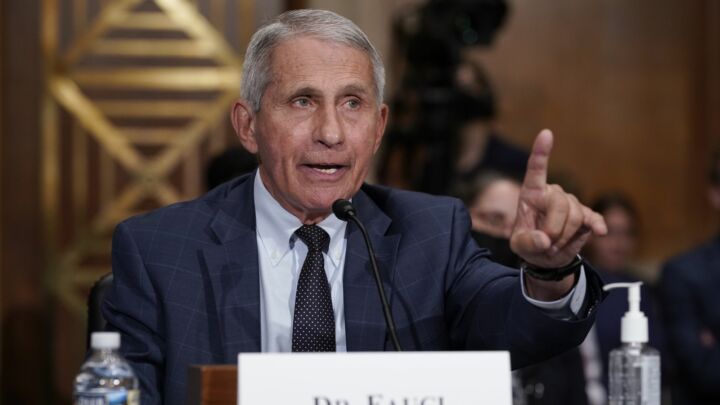The sinister cruelty of lockdown has been laid bare
We now know just how drunk on tyranny the political class was during the pandemic.

Want to read spiked ad-free? Become a spiked supporter.
They were laughing at us. They didn’t only lock us down. They didn’t only suspend virtually every one of our civil liberties, including a right none of us ever expected to lose: the right to leave our own homes. They didn’t only spy on us with drones, and encourage us to snitch on that neighbour going for a sneaky second jog, and fine teenagers life-ruining sums of money for holding house parties. They also chuckled about it. It was funny to them. In one of the most startling WhatsApp chats revealed in the Daily Telegraph’s Lockdown Files, a senior civil servant says the following about Brits returning from trips abroad who were forced to quarantine in a stuffy hotel room for 10 days: ‘Hilarious.’
It was Simon Case, the UK’s top mandarin. In February 2021 he had a breezy virtual chat with Matt Hancock, the then health secretary. A policy had just been introduced stipulating that any Briton returning from a ‘red list’ country – which eventually included 50 states around the world, including India and vast swathes of Africa – would have to quarantine in a hotel at a cost of £1,750 per person, later rising to £2,285. A total of 200,000 British citizens and residents endured this painful, expensive quarantine. To Hancock and his civil-service pals it was all a big laugh. ‘I just want to see some of the faces of people coming out of first class and into a premier inn shoe box’, chortled Mr Case. He later asked Hancock: ‘Any idea how many people we locked up in hotels yesterday?’ Locked up in hotels. Hancock replied that 149 people ‘are now in Quarantine Hotels due to their own free will!’. ‘Hilarious’, said Case.
Hilarious? Tell that to the people whose lives were ruined by this policy. The idea that it was just reckless rich folk jetting off to exotic destinations that were on the ‘red list’ is ridiculous, as academic Aleksandra Jolkina has explained. Consider the NHS worker who travelled to Ethiopia to visit his dying uncle and look after his sick mother. While he was there Ethiopia was added to the ‘red list’, meaning he could not return to the UK; he couldn’t afford to. Or the Briton who travelled to Pakistan to visit his terminally ill father. He was forced to raid the family savings to pay the return quarantine fee. As a result, his ‘family’s ability to survive financially’ was put ‘at risk’. Or think about the many Brits who did not go abroad, to one of those supposedly toxic countries, because they didn’t have the funds for that stay in a ‘premier inn shoe box’. People who, as Jolkina describes it, could not ‘visit their ill relatives or wish them a final farewell’. Hilarious, right?
The sinister cruelty of lockdown is laid bare in this grotesque vision of officials laughing over a policy that caused so much heartache and hardship among often low-earning Brits whose only crime is that their families live overseas. You couldn’t have asked for a better snapshot of the feudalistic authoritarianism that underpinned the ideology of lockdown. Civil servants working from their plush homes having a giggle about a policy that inflicted severe financial pain on the diverse working classes. A health secretary breaking his own guidelines to snog his mistress while sending snide WhatsApp messages about a policy that prevented poorer citizens from kissing the cheek of a dying relative. For me, this is the most important thing about the Lockdown Files – their revelation of just how morally cavalier and even inhuman the political elites can become when they are drunk on power, when they are liberated from democratic accountability to pursue whatever extreme policies they like.
The Telegraph’s Lockdown Files are based on more than 100,000 WhatsApp messages sent and received by Matt Hancock in the pandemic years. Hancock gave the messages to Isabel Oakeshott when she was co-writing his book, Pandemic Diaries, and now Ms Oakeshott has given them to the Telegraph. They provide only a partial insight into the machinations of lockdown, of course. Hancock is not the centre of the universe, whatever he might think to the contrary. And he says some of the messages are being taken out of context. Perhaps. Nonetheless, the Lockdown Files represent our first serious reckoning with lockdown, our first glimpse at what was happening behind the scenes of this unprecedented exercise in social control. And it’s not a pretty picture.
We now know that sections of the political elite relished the power lockdown gave them. At points they seemed almost drunk on tyranny. So, alongside making fun of the sometimes life-ruining policy of forced quarantine, Hancock demanded that cops be more heavy-handed in enforcing the lockdown. ‘[We] are going to have to get heavy with the police’, he said to Simon Case in August 2020. A few months later, he was chuffed when then PM Boris Johnson did indeed put pressure on police to collar lockdown deviants – ‘the plod got their marching orders’, Hancock said. Boris seemed to get a kick from authoritarian enforcement, too. When Hancock WhatsApped him a news article about two people being fined £10,000 for failing to quarantine, Boris replied: ‘Superb.’ Do these people know how much money that is to the vast majority of people? Being fined 10 grand would cast a financial shadow over many people’s lives for years.
At times, there was an expressly political bent to their lockdown illiberalism. One of Hancock’s advisers, Jamie Njoku-Goodwin, wondered what might be done about ‘pub hooligan’ Nigel Farage. Following a news report that implied Farage had flouted quarantine rules upon his return from the US, Njoku-Goodwin asked: ‘Can we lock him up?’ This may have been a joke (although given many of them really were messaging with glee about people being ‘locked up in hotels’, I’m not so sure). But the fact that officialdom had reached the low of talking about locking up their political critics demonstrates how far they had sailed from decency and democracy on that ship of lockdown. Likewise, when Piers Morgan left Good Morning Britain in March 2021, social-care minister Helen Whately suggested to Hancock that they should ‘celebrate’ at their ‘team meeting’. It’s hard to know what’s worse – their censorious delight at TV being rid of one of its awkward voices or their suggestion of a communal celebration at a time when the rest of us risked investigation by ‘the plod’ if we did such a thing.
Then there was their aversion to alternative ways of thinking. They seemed allergic to any idea that might contradict their lockdown fanaticism. Secrecy was a key component of their chatter. Very early in the pandemic, before we locked down, there were WhatsApp conversations about the fact that people were already changing their behaviour and going out far less. ‘[So] how much additional benefit does “locking down” actually get you?’, asked a Treasury official. Data showed that 54 per cent of people were already socially distancing. ‘Just for us all to see’, the WhatsApp group was instructed about such information. A few months later, Hancock was increasingly irate about the Sweden issue, the possibility that this nation that didn’t enforce a sweeping lockdown might be doing quite well. I am sick of the ‘fucking Sweden argument’, he said. ‘Supply three or four bullet [points] of why Sweden is wrong’, he demanded of his aides.
That is extraordinary, no? As Fraser Nelson notes, Hancock notably did not ask whether Sweden was wrong but why it was wrong. He wasn’t interested in openly discussing pandemic policy, but rather in insulating his own lockdown ideology from contrasting or contradictory ideas and data. Likewise, he was horrified when Boris Johnson started taking advice from lockdown-sceptical experts like Carl Heneghan, director of the Centre for Evidence-Based Medicine at Oxford. Johnson said ‘red teams’ – that is, groups of experts that might notice flaws in government claims and policies – would be a good thing, but Hancock was not so sure. Among the firmest lockdown believers, scurrying away from scrutiny became the overarching aim.
Let’s talk about Carl Heneghan. And about Sunetra Gupta, Jay Bhattacharya and Martin Kulldorff, key signatories to the Great Barrington Declaration. These people made the case, eloquently and frequently, against blanket lockdowns and for focused protection of those who would suffer most from a Covid infection – namely, the elderly and people with certain underlying conditions. Heneghan argued for the fierce ringfencing of care homes, in particular, so that concentrated communities of the most vulnerable would be protected from infection and death. Meanwhile, what was Hancock doing? As Fraser Myers has documented on spiked, Hancock was resisting advice from chief medical officer Chris Whitty to test everyone entering care homes. According to the leaked texts, Hancock was seemingly concerned that such an endeavour would ‘muddy the waters’ of lockdown messaging. The leaked WhatsApps have led many to conclude that Hancock was especially worried that care-home testing would distract attention from his big, virtuous, legacy-defining effort to ensure that there would be 100,000 Covid tests a day in the broader community. A reminder: 45,000 care-home residents in England and Wales perished from Covid.
Nothing speaks better to the warped moralism of the Covid era than the fact that sceptics like Heneghan who argued for the elderly and frail to be protected have been demonised as dangerous ‘Covid deniers’, while government officials whose policies had a direct and catastrophic impact on the health of the elderly and frail were, for a period of time at least, treated as unimpeachable voices of moral authority. We need a complete reversal of the Covid narrative. If I see one more angry article in the supposedly liberal media railing against Heneghan or Gupta or any of the others who said ‘Let’s plough our resources into protecting the vulnerable’, now that we know our lockdown elites failed to protect the vulnerable, I will lose it.
Ms Oakeshott is a backstabber and a money-grubber for revealing these WhatsApp messages, some are saying. Oh stop it. Nothing could be more in the public interest than knowing the thinking behind an ideology and a policy that wrecked civil liberty, suspended democracy, sickened the elderly, hurt the working classes, quarantined the developing world, and led to a suspension of that most key of civilised endeavours: the education of children. A pandemic hit, and the political elite, and the media elite, opted for social tyranny, censorship, non-debate, classism and fearmongering over taking a more rational, liberal, focused approach to the risk of disease. We need to know all about this, so that we might guard against it in the future.
Brendan O’Neill is spiked’s chief political writer and host of the spiked podcast, The Brendan O’Neill Show. Subscribe to the podcast here. And find Brendan on Instagram: @burntoakboy
Picture by: Getty.
Celebrate 25 years of spiked!
A media ecosystem dominated by a handful of billionaire owners, bad actors spreading disinformation online and the rich and powerful trying to stop us publishing stories. But we have you on our side. help to fund our journalism and those who choose All-access digital enjoy exclusive extras:
- Unlimited articles in our app and ad-free reading on all devices
- Exclusive newsletter and far fewer asks for support
- Full access to the Guardian Feast app
If you can, please support us on a monthly basis and make a big impact in support of open, independent journalism. Thank you.







Comments
Want to join the conversation?
Only spiked supporters and patrons, who donate regularly to us, can comment on our articles.